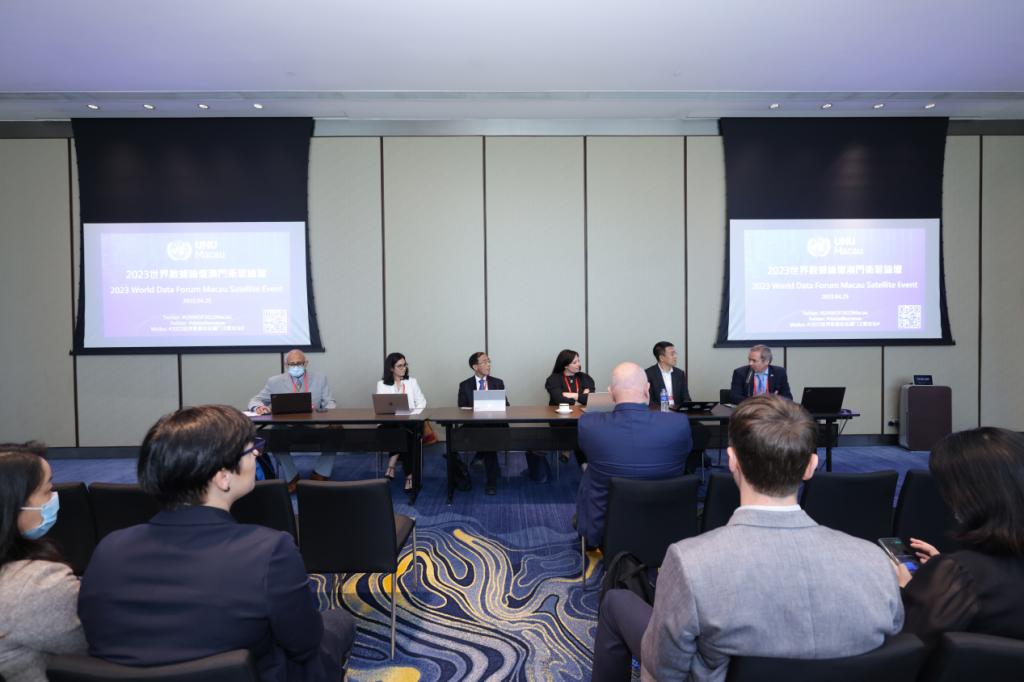On April 25, 2023 World Data Forum Macau Satellite Event kicked off in Macau. The theme is “Dealing with data dilemmas: Risks and opportunities of a human-centred systems approach to data and digital technology development”. During the full-day conference, academics, members of government agencies, professionals in the private sector, civil society members and students discussed data dilemmas across a variety of themes, while reflecting on whether taking a human-centred systems approach can help solve these.
The Macau event, organized by the United Nations University Institute in Macau (UNU Macau) in partnership with Centre for Data Science, University of Macau, Faculty of Innovation Engineering, Macau University of Science and Technology, and University of Saint Joseph, was a satellite event of this year’s United Nations World Data Forum, which is being held in Hangzhou, China, from April 24 to April 27.
In the opening plenary session, United Nations University’s Rector and Under-Secretary-General of the United Nations, Professor Tshilidzi Marwala, presented a keynote speech. He said, “We are in midst of an age of accelerating technological development, marked by rapid advancements in big data, digitalization, and artificial intelligence (AI). These changes offer incredible opportunities, but also risks that must be addressed.”
As UNU Macau’s Senior Research Advisor Mr. Franz Gatzweiler said in the opening plenary session, “data and digital technologies have helped us to connect to one another better, exchange goods and services faster, access information and knowledge easier, reduced costs, and thereby they helped many to escape poverty and to be included in the economy and society. But they have also brought us many dilemmas”. “At UNU Macau, we think that a human-centred systems approach to data and digital technologies will help us address those dilemmas. What that approach means exactly still needs to be defined by us all. And we need to translate our knowledge faster into global collective action”, Mr. Gatzweiler added.
LIANG Zheng, Vice Dean of the Institute for AI International Governance of Tsinghua University (I-AIIG), delivered a speech in the parallel session on Regulatory Dilemmas Involving Digital Technologies. He pointed out that people usually face the “Collingridge Dilemma” in the regulation of emerging technologies such as AI, gene editing, etc., which means when the new technology hasn’t emerged, the regulators couldn’t predict its influence and take actions in advance, and when it already emerged, the regulation is always too late to change the direction. Thus why the latest progresses in AI such as ChatGPT and GPT-4 arose universal worries about potential issues for humanity. LIANG emphasized that stakeholders should adopt “agile governance” to reach a balance between innovation incentives and risk prevention, and give suggestions on macro, meso, and micro-levels, including ethic discussion, legislative framework, governance experiment, and self-compliance, as well as the regulation coordination among different countries and governance dialogues under the framework of UN.

YU Yang, Director of the International Exchange Program of the Institute for AI International Governance (I-AIIG), delivered a speech in the parallel session on Cross Border Data Transfer. He said that “Auditing the information leakage of latent sensitive features during the transborder data flow has attracted sufficient attention from global digital regulators. However, there is missing a technical approach for the audit practice due to two technical challenges- the lack of theory and tools for measuring the information of sensitive latent features in a dataset, and the insufficient trust in the audit.” To unveil such risks trustfully before the actual data transfer, YU’s team proposes FIAT, a fine-grained information audit system for trustless transborder data flow. “In FIAT, we use a learning approach to quantify the amount of information leakage, while the technologies of zero-knowledge proof and smart contracts are applied to provide trustworthy and privacy-preserving auditing results. The efficiency and scalability of the FIAT auditing system have been validated”, he added.

About the United Nations World Data Forum (UNWDF):
Following one of the main recommendations contained in the report entitled “A World That Counts”, presented in November 2014 by the United Nations Secretary-General’s Independent Expert and Advisory Group on Data Revolution for Sustainable Development, the Statistical Commission agreed that a United Nations World Data Forum on Sustainable Development Data (UN World Data Forum) would be the suitable platform for intensifying cooperation with various professional groups, such as information technology, geospatial information managers, data scientists, and users, as well as civil society stakeholders. The Forum’s community has grown from 2,000 people who attended the first and second Forum in Cape Town, South Africa and Dubai, United Arab Emirates to an active list of over 20,000 interested stakeholders. This growth in interest was due to the more open and accessible Forums held virtually in 2020 and as a hybrid format in Bern, Switzerland in 2021, and the establishment of a regular webinar series to maintain interest and focus between Forums. The stakeholder community represents a diverse range of governments, civil society, the private sector, donor and philanthropic bodies, international and regional agencies, the geospatial community, the media, academia, and professional bodies.